Diablo 2: Resurrected just makes me want to run back to Diablo 3
What was brilliant in 2000 now just feels creaky.
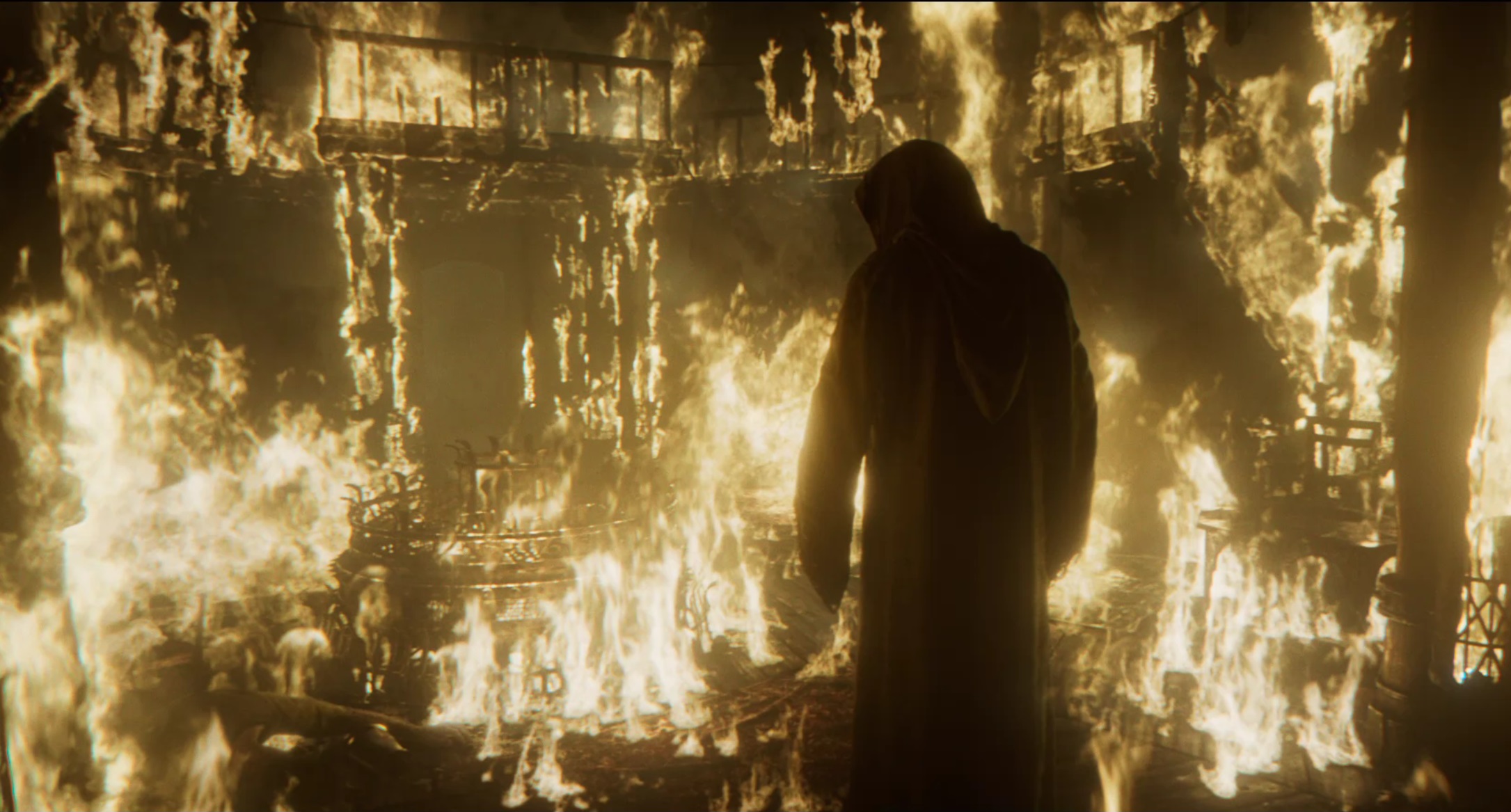
I was 14 when Diablo 2 clawed its way out of Hell and into my heart. For a spotty teen metalhead, it didn't get much better than marching through impenetrably dark dungeons, chopping up demons and watching things explode in a shower of gibs and loot. It was unbeatable, I thought. And sure enough, when Diablo 3 came along over a decade later, it couldn't hold a candle to its predecessor. It was too bright. Too easy. Even during the deepest part of my D3 obsession, it was always the second-best Diablo.
Diablo 2: Resurrected is out today. It's been gussied up, and there are some mostly optional quality of life improvements, but this is still the same game that I've had on a pedestal for all these years. The moment Marius's narration began in the opening cutscene, the hairs on the back of my neck didn't just stand up—it felt like they were trying to jump out of my skin. And that first "Greetings, stranger" in the Rogue Encampment? I clapped like a drunk sea lion. And from there it all went downhill.
I'm not really enjoying Diablo 2.
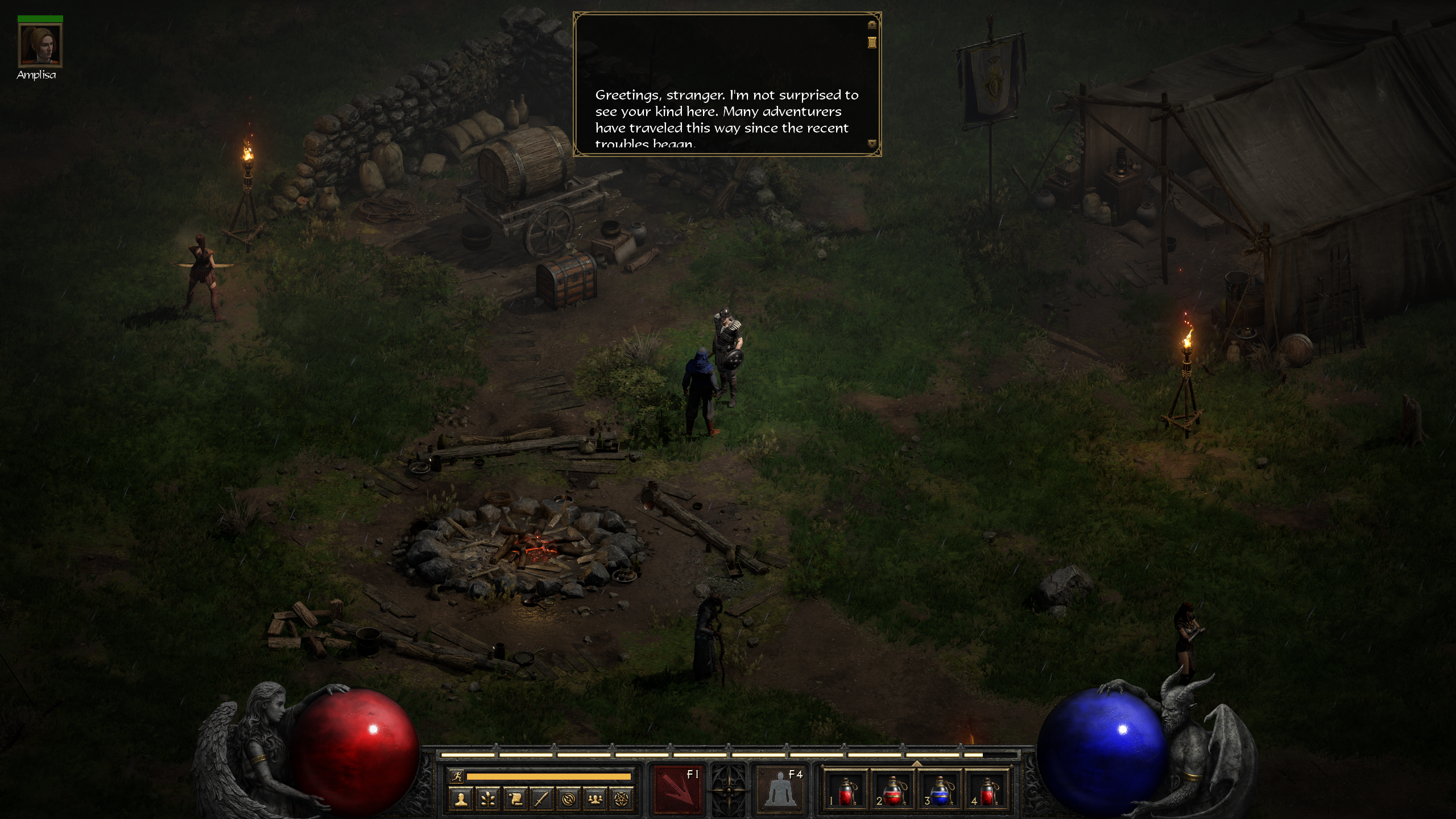
Now, I've not imagined all the stuff I used to love about this classic ARPG, and I didn't have terrible taste as a teen—at least not when it came to RPGs—but things have moved on considerably over the last 20 years. My expectations have changed, too. With some remasters, the appeal is replaying something that was an evolutionary dead end or the absolute pinnacle of the genre—something singular. But Diablo 2 is far from unique, and it turns out that all of the additions, all of the growth that we've encountered in Torchlight, Grim Dawn, Path of Exile and, yes, Diablo 3, make the 2000 classic feel like a bit of an antique.
All of the growth that we've encountered in Torchlight, Grim Dawn, Path of Exile and, yes, Diablo 3, make the 2000 classic feel like a bit of an antique.
Even something as simple as moving my creepy old necromancer is deeply unpleasant, with a stamina bar that drains when you run and grid-based movement that makes turning around look and feel clunky. None of these things stuck in my memory, and none of them were an issue back in 2000, but it's jarring to go from a smooth ARPG like Diablo 3 to this. Just writing about the stamina bar is making me annoyed all over again. It's awful! This isn't Dark Souls, where it's inextricably linked to combat, determining the flow of fights, and giving you those exciting moments where you risk everything on one last attack, knowing it could be your last. It just means you're shit at running. God I hate it.
Little frustrations pile up. There's the dodgy pathfinding, the ease with which you can get stuck on detritus in the middle of a fight, the way objects can block your vision of enemies and your own character. This was apparent during the technical alpha, but I'd hoped, perhaps foolishly, that some of these jagged edges would have been smoothed out by launch. They have not.

What about actually building your character? I thought I preferred Diablo 2's ability trees, which on the surface offer a lot more variety and, importantly, big choices. But that just doesn't hold up to scrutiny. Yes, there are more choices, but a lot of the time you're just putting points into things that incrementally increase the power of an ability, or worse—putting points into something you don't care about at all, just so you can get to something further down the tree.
Keep up to date with the most important stories and the best deals, as picked by the PC Gamer team.
As a necromancer, for instance, you'll perhaps put points into summoning skeletons first, and with your first few points your bony minions will increase in power and number. Further points, however, only increase the power of your undead pals, which you can also do with skeleton mastery, a separate passive ability. Places where it could obviously be streamlined crop up everywhere, and of course that's exactly what Diablo 3 ended up doing.
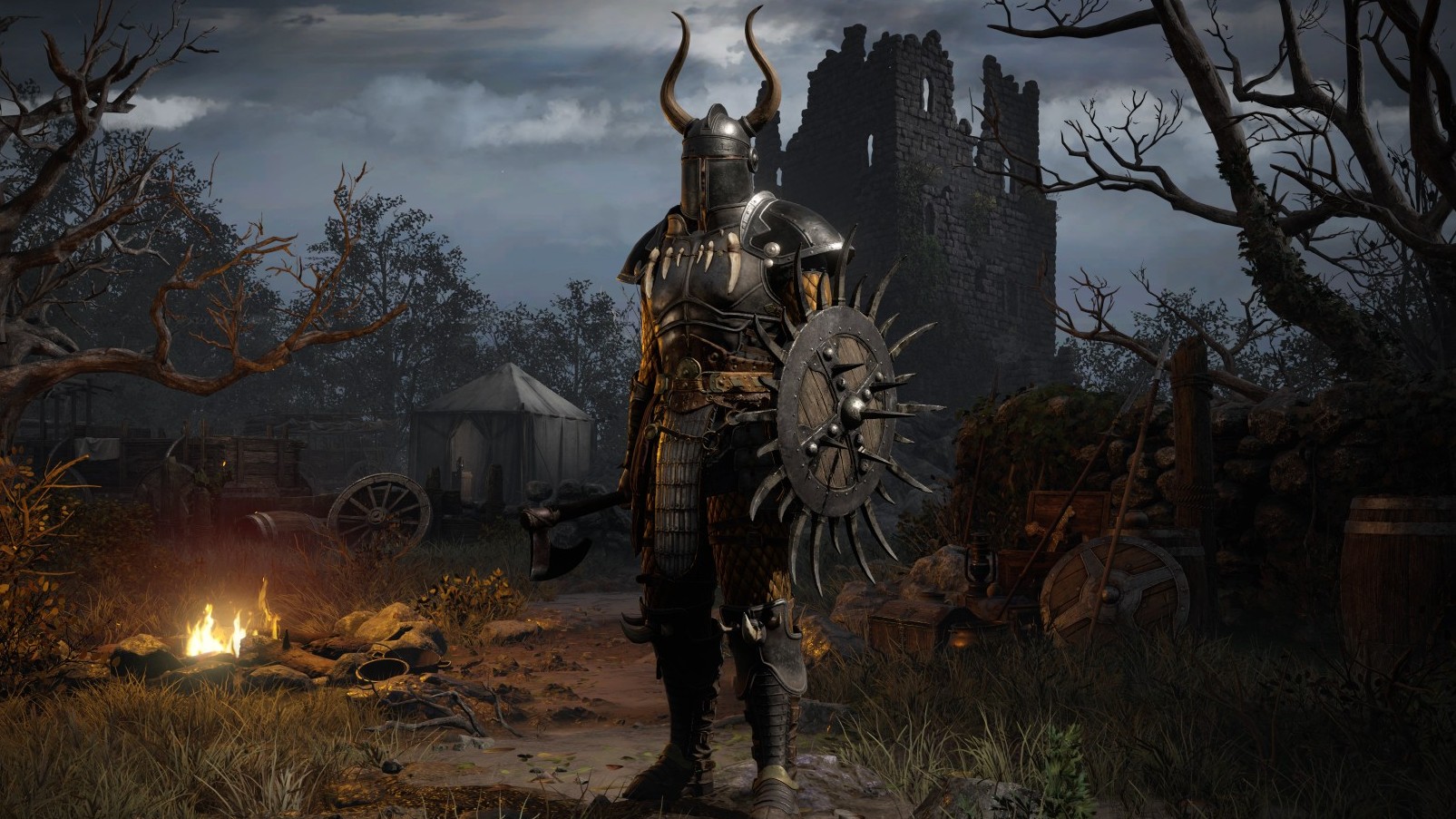
If you've been overcome with nostalgia and decided to chase the Wanderer again, take a look at our Diablo 2: Resurrected class guide to help you pick between the Amazon, Assassin, Barbarian, Druid, Necromancer, Paladin or Sorceress.
I should add that I don't think Diablo 2's character progression is bad. Not at all. You level up fast, and there are so many different ways to make whatever class you pick your own. They might not all be viable for the endgame or PvP, but that is less of an issue now that you can easily reroll your character. This flexibility is borrowed from Diablo 3, however, which also makes me crave the other ways in which Diablo 3 improves experimenting with builds. See, while there are fewer abilities, all of them can be augmented with runes, dramatically changing them. Every time you unlock a new ability or rune, you've got something that can fundamentally change how your character plays. Ultimately, it's just more fun to fiddle around with, and the differences between builds are more dramatic, more meaningful.
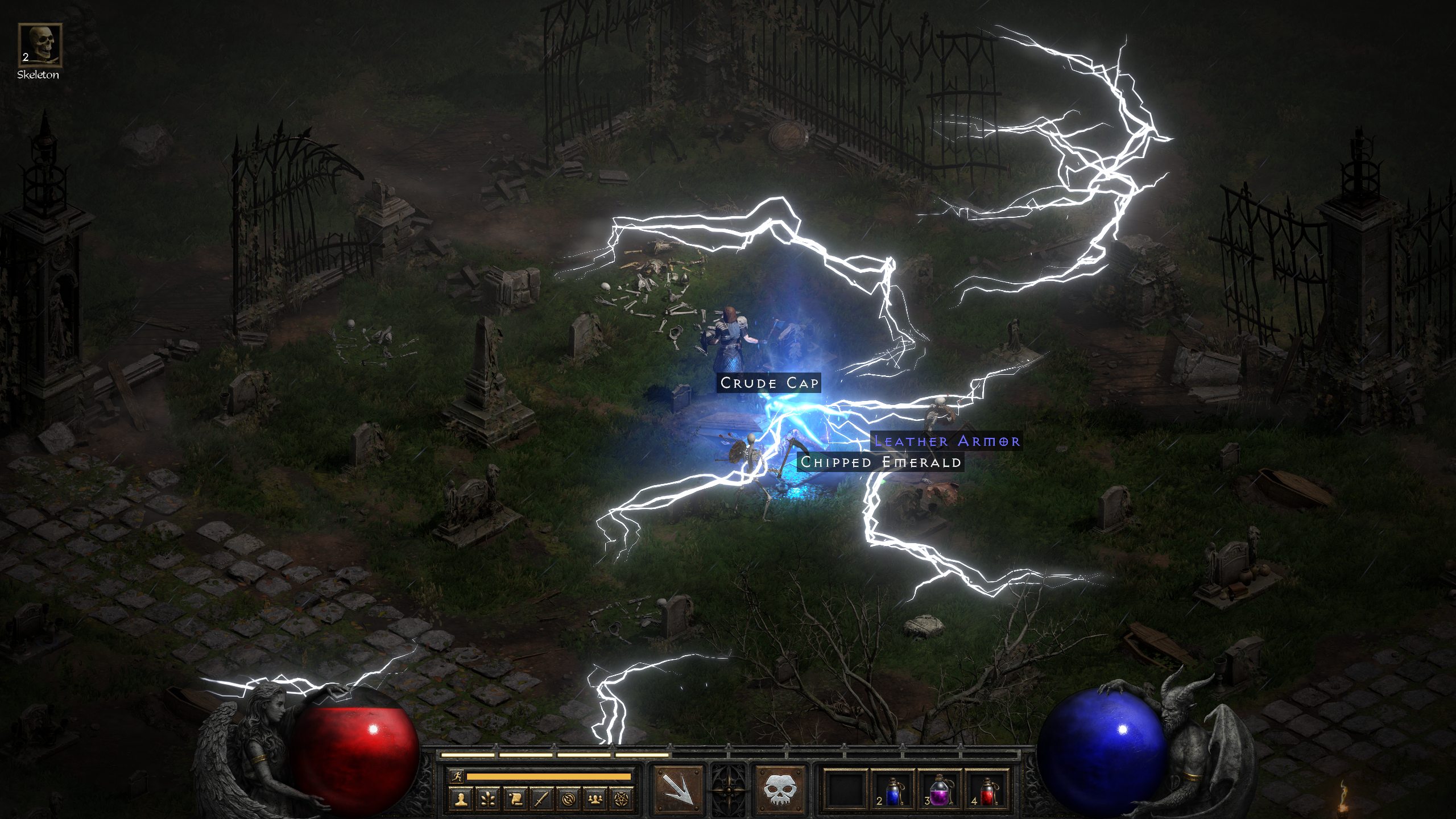
This brings us to how you actually use your abilities, back before Blizzard had refined its UI and hotbars. See, abilities are mapped to the mouse buttons, and you can only have two active at a time. That's incredibly inflexible, which Diablo 2 seems to realise, hence why you can map all of your abilities to F1-F8. Unfortunately, using those hotkeys doesn't actually fire off the ability; instead it just changes what ability is mapped to the mouse buttons. To not have the option of enabling a more modern "press key, cast ability" input scheme seems like an oversight. Even with a few unlocked abilities, micromanagement really becomes a pain in the arse, especially when a momentary interruption in your concentration can spell death.
Speaking of things that will kill you, potion management is a real headache. How potions work isn't especially egregious: you put them in your potion hotbar, use them once, and they're gone. Bog standard. The real issue is they don't stack. Nothing stacks! So your inventory will be bursting with potions, taking up vital space until you make room for them in your hotbar.
Places where it could obviously be streamlined crop up everywhere, and of course that's exactly what Diablo 3 ended up doing.
This is one area, however, where Diablo 3 doesn't have a much better solution. In the sequel, you mainly rely on health orbs, and maintaining your health is something you hardly need to consider at all. Path of Exile's system is far superior, where you've just got a handful of flasks, each with different attributes—much like the rest of your gear—and a number of charges. They just have so much more utility, and they don't vanish once you've quaffed them down.
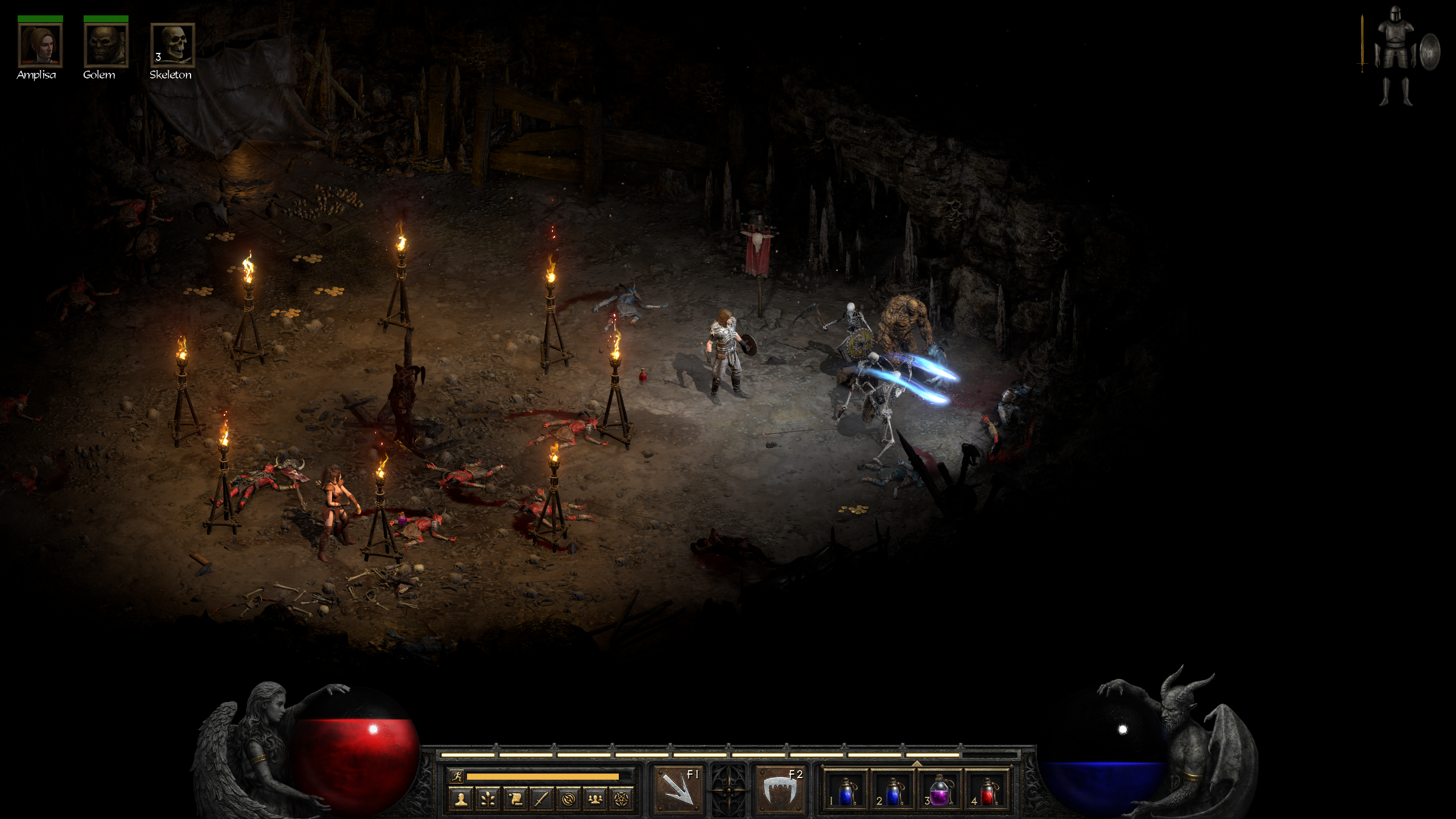
At least we get a decent shared stash now. Your inventory might be laughably small, but the stash is massive. Again, though, this is something that's been brought over from Diablo 3, which just makes me wonder why I ever thought it was the inferior Diablo.
I've yet to see what Diablo 2: Resurrected does with its endgame, but honestly I won't be sticking around for that long. But if it's consistent with the original, it's another place where, I've got to admit, Diablo 3 does it better. Both are grindy as hell, but they're ARPGs—what do you expect? Diablo 3's Adventure Mode, seasons and rifts, however, are far superior to Diablo 2's boss farming and the grindy march to level 99. Crucially Diablo 3's endgame has proper structure and plenty of discrete challenges. Ladders gave Diablo 2 some structure, but won't be included in Resurrected until after launch.
The atmosphere, the aesthetic, the music—these things are all still killer. Even in Legacy mode, which returns the game to its original form, it just has this air about it, an edge, that penetrates the ancient pixels. It's got style for days. The narrative, too, is the best of any ARPG. You're almost a side-character, following the chaos that the Dark Wanderer, Diablo's original hero, leaves in his wake. This is all the fallout of a heroic act—your heroic act, if you played the first game. It's genuinely gripping, and that hasn't changed. Some things are just timeless. But it's so much harder to enjoy now. Diablo 3 might have a completely forgettable yarn, but it's one I have a lot more fun playing through in 2021.
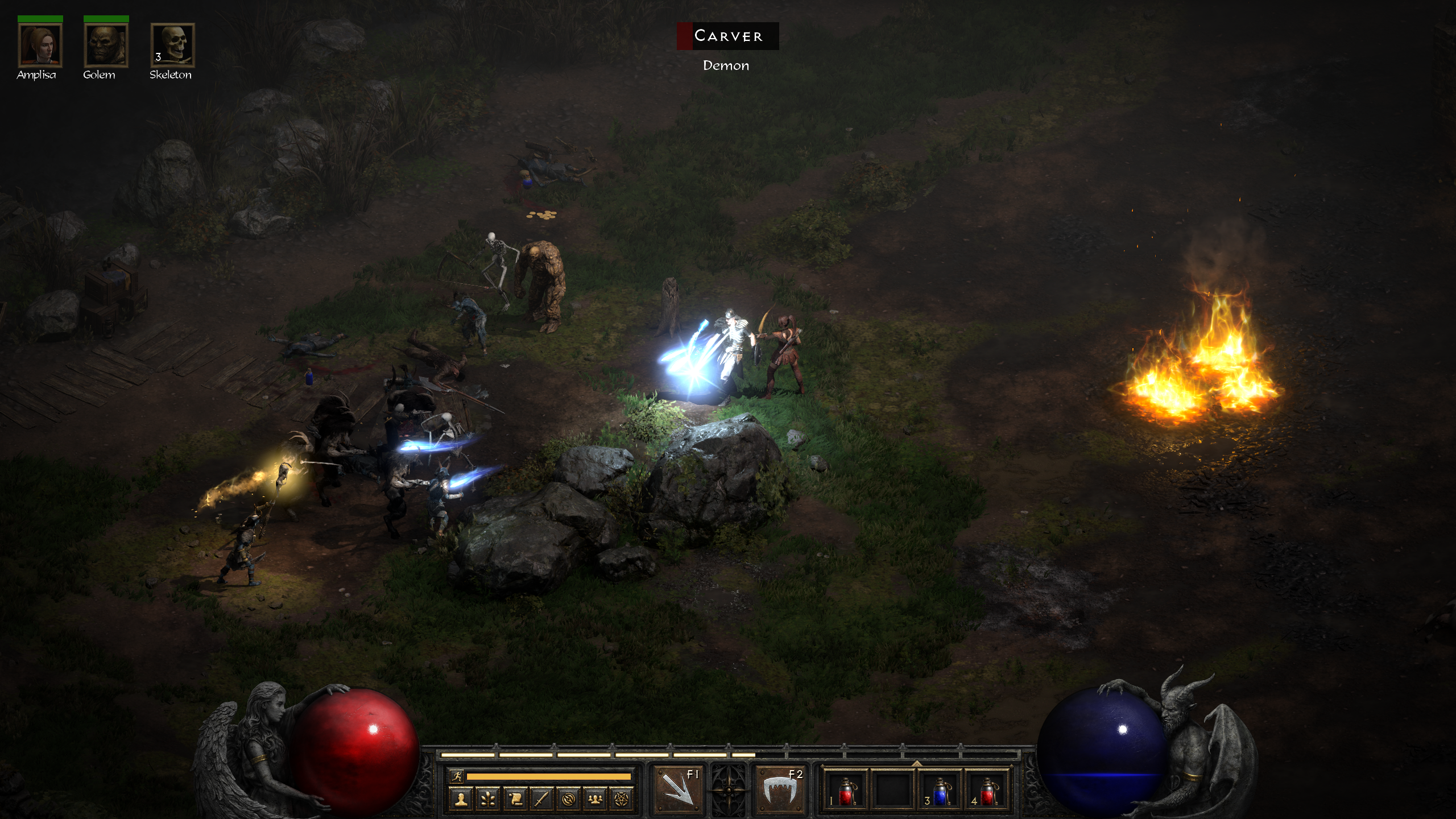
I suspect hordes of former players are still going to love returning to Diablo 2. There are still people playing the classic version today. And I get it. Modern isometric ARPGs for the most part don't have an adversarial relationship with the player. There are plenty of challenges to be found, certainly, but Diablo 2 really wants to kill you, and that holds a certain appeal. That's also why I was excited about the remaster. I want an isometric ARPG that can kick the shit out of me. But this time it wasn't tricky encounters murdering me—it was the creaky design and flaws that are so old they've become sacred.
Replaying Diablo 2 now makes it so clear how many of Diablo 3's streamlined additions—some of which I absolutely didn't approve of in 2012—were direct responses to places where its predecessor felt stiff or obtuse. A lot of what I once considered 'hardcore', it turns out, is really just old, and existed because we didn't know any better. Yes, videogame characters can run forever without getting out of breath, and now we know. This doesn't detract from the impact Diablo 2 had at the time, or how important it is in the history of ARPGs, but it is a reminder that time comes for every game.
So I'm sorry, Diablo 3. For years I've failed to give you the respect you deserve. You're still not my favourite ARPG, but I'd definitely pick you over your predecessor. Or I can just go back to Path of Exile. Yeah, I think I'll do that.

Fraser is the UK online editor and has actually met The Internet in person. With over a decade of experience, he's been around the block a few times, serving as a freelancer, news editor and prolific reviewer. Strategy games have been a 30-year-long obsession, from tiny RTSs to sprawling political sims, and he never turns down the chance to rave about Total War or Crusader Kings. He's also been known to set up shop in the latest MMO and likes to wind down with an endlessly deep, systemic RPG. These days, when he's not editing, he can usually be found writing features that are 1,000 words too long or talking about his dog.

